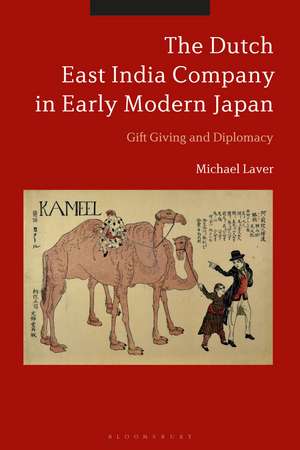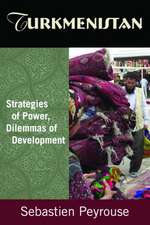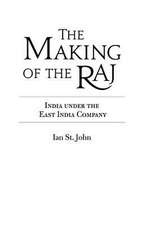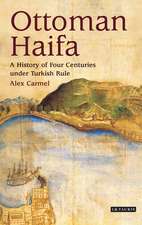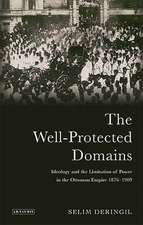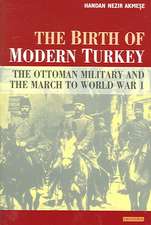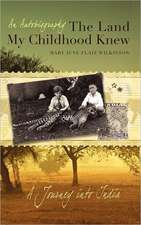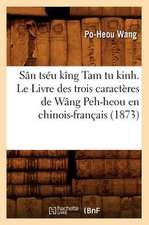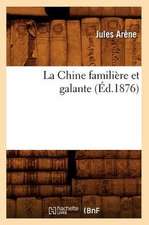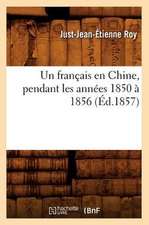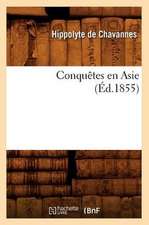The Dutch East India Company in Early Modern Japan: Gift Giving and Diplomacy
Autor Associate Professor Michael Laveren Limba Engleză Paperback – 20 oct 2021
| Toate formatele și edițiile | Preț | Express |
|---|---|---|
| Paperback (1) | 216.08 lei 6-8 săpt. | |
| Bloomsbury Publishing – 20 oct 2021 | 216.08 lei 6-8 săpt. | |
| Hardback (1) | 596.88 lei 6-8 săpt. | |
| Bloomsbury Publishing – 15 apr 2020 | 596.88 lei 6-8 săpt. |
Preț: 216.08 lei
Preț vechi: 274.05 lei
-21% Nou
Puncte Express: 324
Preț estimativ în valută:
41.35€ • 43.26$ • 34.35£
41.35€ • 43.26$ • 34.35£
Carte tipărită la comandă
Livrare economică 02-16 aprilie
Preluare comenzi: 021 569.72.76
Specificații
ISBN-13: 9781350246812
ISBN-10: 1350246816
Pagini: 240
Dimensiuni: 156 x 234 x 14 mm
Greutate: 0.27 kg
Editura: Bloomsbury Publishing
Colecția Bloomsbury Academic
Locul publicării:London, United Kingdom
ISBN-10: 1350246816
Pagini: 240
Dimensiuni: 156 x 234 x 14 mm
Greutate: 0.27 kg
Editura: Bloomsbury Publishing
Colecția Bloomsbury Academic
Locul publicării:London, United Kingdom
Caracteristici
An important study for a wide audience interested in material culture, Japanese relations with the West, Japanese history, Dutch history and cultural exchange in global history
Notă biografică
Michael Laver is Department Chair and Associate Professor of History at the Rochester Institute of Technology, USA. He is the author of The Sakoku Edicts and the Politics of Tokugawa Hegemony (2011) and Japan's Economy by Proxy in the Seventeenth Century (2008).
Cuprins
List of IllustrationsIntroduction: The VOC and the Rhythm of Life in Early Modern Japan1. Gift Giving and the Early Modern Web of Diplomacy2. The Shogun's Menagerie: Exotic Animals as Gifts3. Objet d'art: Most Exquisite Curiosities of Nature and Art4. Curios, Rarities and European Manufactured Goods5. Butter Diplomacy: Food and Drink as Gifts6. A Tale of Two LanternsConclusionBibliographyIndex
Recenzii
Laver's strength is storytelling. He makes use of many detailed examples, culled almost exclusively from the seventeenth-century 'dagregisters', to engage the reader.
Michael Laver's concise but wide-ranging study of the Dutch East India Company in Tokugawa Japan adopts the lens of gift exchange to provide a fascinating account of the political, social, and material engagements that facilitated and embodied the Japanese-Dutch relationship from the early seventeenth to the mid-nineteenth century.
Michael Laver collects fascinating stories about the political and economic roles played by the performance of gift exchanges between the Dutch East India Company and the Japanese. All those interested in the history of trade will find this book both illuminating, enjoyable, and broadly readable.
This study brings together scattered and sometimes inaccessible data to position the shogun's realm firmly within the burgeoning field of diplomatic history and present-giving. It will be of use to historians of international encounter, overseas trade, knowledge transfer, and all those who wonder how cultures seek - and so often fail - to put themselves across when encounter the Other.
Michael Laver's The Dutch East India Company in Early Modern Japan: Gift Giving and Diplomacy presents a readable, coherent, and detailed study of gift giving and its importance to the Dutch East India Company in maintaining its trade relationship with Tokugawa leaders.
Michael Laver's concise but wide-ranging study of the Dutch East India Company in Tokugawa Japan adopts the lens of gift exchange to provide a fascinating account of the political, social, and material engagements that facilitated and embodied the Japanese-Dutch relationship from the early seventeenth to the mid-nineteenth century.
Michael Laver collects fascinating stories about the political and economic roles played by the performance of gift exchanges between the Dutch East India Company and the Japanese. All those interested in the history of trade will find this book both illuminating, enjoyable, and broadly readable.
This study brings together scattered and sometimes inaccessible data to position the shogun's realm firmly within the burgeoning field of diplomatic history and present-giving. It will be of use to historians of international encounter, overseas trade, knowledge transfer, and all those who wonder how cultures seek - and so often fail - to put themselves across when encounter the Other.
Michael Laver's The Dutch East India Company in Early Modern Japan: Gift Giving and Diplomacy presents a readable, coherent, and detailed study of gift giving and its importance to the Dutch East India Company in maintaining its trade relationship with Tokugawa leaders.
